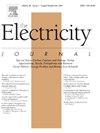全球北方和南方风电场的环境许可:指导方针和新建议的审查
IF 2.2
Q1 Social Sciences
引用次数: 0
摘要
通过风力发电场生产可再生能源是能源转型的主要战略之一。但是,这种活动的许可制度在许多国家尚未很好地确立,或存在差距,从而可能发生或加剧不利的环境影响。本文旨在对过去十年来全球北方和南方陆上和海上风电场的环境许可程序进行系统审查,以了解哪些法律要求对环境保护有效,以及管理此类企业的监管文件中缺乏哪些内容,以使其更具可持续性。所采用的策略是:(i)从被分析国家的立法、环境或能源机构、科学出版物、国际协定、技术报告等收集信息,以及(ii)系统地审查过去10年发表的关于风力发电影响及其在世界各地的许可的文章。因此,在监管方面观察到的主要问题是缺乏关于环境许可的强有力和具体的法律,风力活动或小型风力发电场的环境影响评估是非强制性的,许可过程的延误,以及不同机构之间的许可证发放分散。最后,强调将风电许可程序标准化,要求进行环境影响研究、公众参与和有效监测,将是防止许可失败造成影响的适当方法。本文章由计算机程序翻译,如有差异,请以英文原文为准。
Environmental licensing of wind farms in the Global North and South: A review of guidelines and new proposals
The production of renewable energy through wind farms is one of the main strategies for the energy transition. However, the licensing system for this activity is not yet well established or contains gaps in many countries, which allows for the occurrence or intensification of negative environmental impacts. This article aims to conduct a systematic review of the environmental licensing processes for onshore and offshore wind farms in the Global North and South over the past ten years, in order to understand which legal requirements have been effective for environmental protection and what is lacking in the regulatory documents governing this type of enterprise to make it a more sustainable practice. The strategies used were: (i) the collection of information from the legislation of the analyzed countries, environmental or energy agencies, scientific publications, international agreements, technical reports, etc., and (ii) a systematic review of articles published in the last 10 years on the impacts of wind power and its licensing around the world. As a result, the main problems observed in regulation were the absence of strong and specific laws on environmental licensing, the non-mandatory nature of Environmental Impact Assessments for wind activities or small-scale wind farms, delays in the licensing process, and the dispersion of license issuance across different agencies. In conclusion, it is emphasized that standardizing the wind power licensing process with the requirement of environmental impact studies, public participation, and efficient monitoring would be an appropriate method to prevent impacts resulting from licensing failures.
求助全文
通过发布文献求助,成功后即可免费获取论文全文。
去求助
来源期刊

Electricity Journal
Business, Management and Accounting-Business and International Management
CiteScore
5.80
自引率
0.00%
发文量
95
审稿时长
31 days
期刊介绍:
The Electricity Journal is the leading journal in electric power policy. The journal deals primarily with fuel diversity and the energy mix needed for optimal energy market performance, and therefore covers the full spectrum of energy, from coal, nuclear, natural gas and oil, to renewable energy sources including hydro, solar, geothermal and wind power. Recently, the journal has been publishing in emerging areas including energy storage, microgrid strategies, dynamic pricing, cyber security, climate change, cap and trade, distributed generation, net metering, transmission and generation market dynamics. The Electricity Journal aims to bring together the most thoughtful and influential thinkers globally from across industry, practitioners, government, policymakers and academia. The Editorial Advisory Board is comprised of electric industry thought leaders who have served as regulators, consultants, litigators, and market advocates. Their collective experience helps ensure that the most relevant and thought-provoking issues are presented to our readers, and helps navigate the emerging shape and design of the electricity/energy industry.
 求助内容:
求助内容: 应助结果提醒方式:
应助结果提醒方式:


